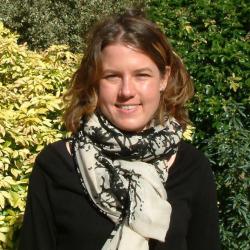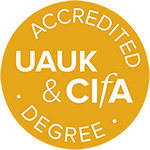Biography
I studied Archaeology at the University of Durham, followed by an MPhil and PhD at Cambridge. After I completed my PhD in 2006, I held research fellowships at Newnham College (2006-09) and the University of Southampton (2009-11). I returned to Cambridge in 2011 to take up the McDonald Institute Anniversary Research Fellowship. In 2013 I was appointed Lecturer in Historical Archaeology.
Research
- Late antiquity and the early medieval period
- Frontiers
- Migration
- Human-environment interactions
- Pastoral economies
- Stable isotope analysis
I am interested in the social transformations during the centuries before and after the end of the Roman Empire, in particular along its north-eastern edges. In my research I integrate theoretical enquiry and what might be called ‘anthropological’ approaches in archaeology with archaeological science, principally isotope analysis.
I have pursued a variety of different questions: Is it possible to identify ethnic identity in burial practices? What can artificially modified skulls tell us about marriage practices and childcare in the fifth and sixth centuries AD?
I have recently worked on the interactions of nomadic pastoralists with settled agricultural populations in the Pannonian basin in the fifth century AD. This work focused on the environmental and climatic context of pastoralist newcomers in Europe, and generated much interest in national and international media.
Currently, I am writing a monograph on the role of the Danube in the formation of new polities in central Europe, following the decline of the Roman Empire. It explores how the social, environmental and climatic context of the river Danube shaped the experiences of people living along the river banks and their relationships with the remaining structures of the Roman Empire. The book is intended as an intervention in a scholarly environment where migrating tribes are still largely seen as the agents of transformation.
Key Publications
| [1] | Hakenbeck, S.E., Büntgen, U. (2022). The role of drought during the Hunnic incursions into central-east Europe in the 4th and 5th c. CE, Journal of Roman Archaeology, 1-21. DOI: 10.1017/S1047759422000332 |
| [2] | Hakenbeck, S. E. (2019). "Genetics, archaeology and the far right: an unholy Trinity." World Archaeology: 1-11. |
| [3] | Hakenbeck, S. E. (2018). Infant head shaping in the first millennium AD. Oxford Handbook of the Archaeology of Childhood. S. Crawford, D. M. Hadley and G. Shepherd. Oxford, Oxford University Press: 483-504. |
| [4] | Hakenbeck, S. E., et al. (2017). Practising pastoralism in an agricultural environment: An isotopic analysis of the impact of the Hunnic incursions on Pannonian populations. PLOS ONE 12(3): e0173079. DOI: 10.1371/journal.pone.0173079
|
| [5] | Hakenbeck S.E. (2011). Local, Regional and Ethnic Identities in Early Medieval Cemeteries in Bavaria, (Contributi di Archaeologia Medievale/ Premio Ottone d’Assia e.) Firenze: All’Insegna del Giglio. |
| [6] | Hakenbeck S.E., McManus E., Geisler H., Grupe G. and O'Connell T.C. (2010). Diet and mobility in early medieval Bavaria: A study of carbon and nitrogen stable isotopes. American Journal of Physical Anthropology, 143, 235-249. DOI: 10.1002/ajpa.21309. |
| [7] | Hakenbeck S.E.(2009). ‘Hunnic’ modified skulls: Physical appearance, identity and the transformative nature of migrations. H. Williams and D. Sayer (eds.), Mortuary Practices and Social Identities in the Middle Ages. Essays in Honour of Heinrich Härke. Exeter: Exeter University Press. 64-80. |
Articles & Chapters
| [1] | Sebald, S. V., Grupe, G., and Hakenbeck, S. (2023). Isotopic sourcing reveals changing subsistence, cultural diversity and biological correlates with palaeodiet in fourth- to seventh-century AD Bavaria. Archaeological and Anthropological Sciences, 15/5: 57. 10.1007/s12520-023-01758-9 |
| [2] | Amorim, C. E. G., S. Vai, C. Posth, A. Modi, I. Koncz, S. Hakenbeck, M. C. La Rocca, B. Mende, D. Bobo, W. Pohl, L. P. Baricco, E. Bedini, P. Francalacci, C. Giostra, T. Vida, D. Winger, U. von Freeden, S. Ghirotto, M. Lari, G. Barbujani, J. Krause, D. Caramelli, P. J. Geary and K. R. Veeramah (2018). Understanding 6th-century barbarian social organization and migration through paleogenomics. Nature Communications 9(1): 3547. DOI: 10.1038/s41467-018-06024-4 |
| [3] | Hannah, E. L., T. R. McLaughlin, E. M. Keaveney and S. E. Hakenbeck (2018). Anglo-Saxon diet in the Conversion period: A comparative isotopic study using carbon and nitrogen. Journal of Archaeological Science: Reports 19: 24-34. DOI: 10.1016/j.jasrep.2018.02.012 |
| [4] | Hakenbeck S.(2014). First Migrants: Ancient Migration in Global Perspective. AMERICAN ANTHROPOLOGIST, 116(2), 437-438. DOI: 10.1111/aman.12090_3. |
| [5] | Hakenbeck S.E.(2013). Potentials and limitations of isotope analysis in early medieval archaeology. Postclassical Archaeologies, 3, 109-125. Link |
| [6] | Hakenbeck S.E.(2013). Correspondence analysis of the cremation urns. C. Hills and S. Lucy (eds.), Spong Hill Part IX: Chronology and Synthesis. McDonald Institute Monographs. 168-195. |
| [7] | Merlo S., Hakenbeck S.E. and Balbo A. (2013). Desert Migrations Project XVIII: The archaeology of the northern Fazzan: a preliminary report. Libyan Studies, 44, 141-161. |
| [8] | Hakenbeck S., Geisler H., Grupe G. and O'Connell T.C. (2012). Investigating diet and mobility in early medieval Bavaria using stable carbon and nitrogen isotopes - A study of mobility and exogamy | Ernährung und mobilität im frühmittelalterlichen bayern anhand einer analyse stabiler kohlenstoff- und stickstoffisotope - Studien zu mobilität und exogamie. Archaologisches Korrespondenzblatt, 42(2), 251-271. |
| [9] | Hakenbeck S.E.(2011). Roman or barbarian? Shifting identities in early medieval cemeteries in Bavaria. Journal of Post-Classical Archaeologies, 1, 37-66. Link |
| [10] | Hakenbeck S.E.(2009). ‘Hunnic’ modified skulls: Physical appearance, identity and the transformative nature of migrations. H. Williams and D. Sayer (eds.), Mortuary Practices and Social Identities in the Middle Ages. Essays in Honour of Heinrich Härke. Exeter: Exeter University Press. 64-80. |
| [11] | Hakenbeck S.E.(2008). Migration in archaeology: Are we nearly there yet?. Archaeological Review from Cambridge, 23(2), 9-26. |
| [12] | Merlo S., Hakenbeck S.E. and Balbo A. (2008). DMP IV: 2008 fieldwork on historic settlement in the Wadi ash-Shati and the Dawada lake villages. Libyan Studies, 39, 295-298. |
| [13] | Hakenbeck S.E.(2007). Identitätsbildungsprozesse im Gräberfeld von Altenerding. C. Grünewald and T. Capelle (eds.), Innere Strukturen von Siedlungen und Gräberfeldern als Spiegel gesellschaftlicher Wirklichkeit. Aschendorff Verlag. 89-97. |
| [14] | Hakenbeck S.E.(2007). Situational ethnicity and nested identities: New approaches to an old problem. Anglo-Saxon Studies in Archaeology and History, 14, 21-34. |
| [15] | Hakenbeck S.E.(2004). Ethnic tensions in early medieval cemeteries in Bavaria. Archaeological Review From Cambridge, 19(2), 40-55. |
Teaching and Supervisions
I coordinate the following undergraduate papers:
- A10 Theory and Method in Archaeology I
- A24 The Medieval Globe (this can be borrowed by History and ASNC students)
I also offer the MPhil module G06 Medieval Europe on a Global Canvas
This module explores the place of medieval Europe in what was an increasingly yet variably connected world. It spans a complex period extending from the highly globalised later Roman empire to the beginnings of European colonisation of the Americas. The module aims to decentre the archaeology of medieval Europe by highlighting the diverse experiences of people during this time.
I have supervised students investigating a range of topics in early medieval archaeology, such as the end of the furnished burial rite in north-west Europe; the impact of Christianisation on dietary practices in England; and the enduring remains of Roman infrastructure in medieval England.
I am interested in supervising students who wish to study for an MPhil or a PhD in the following topics:
• Late Roman and/or early medieval archaeology of England or central Europe
• Changing funerary practices
• Climate and historical ecology
Other Professional Activities
- Fellow of the Society of Antiquaries London
- Post-Classical Archaeologies (editorial board member)



